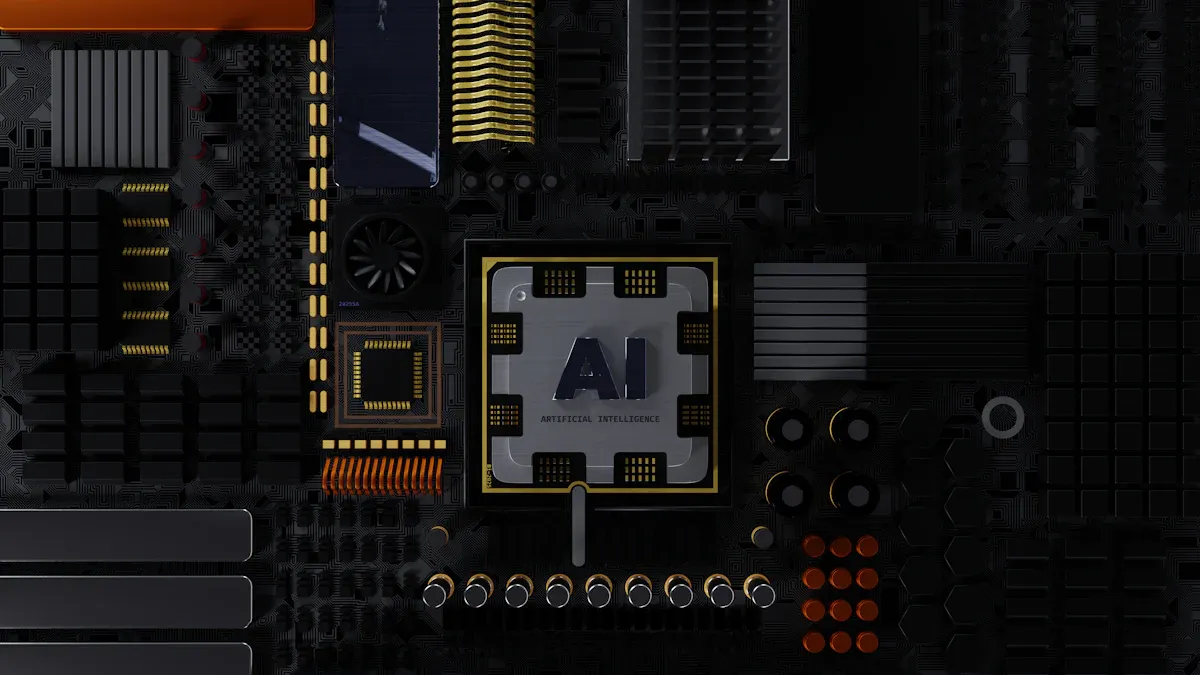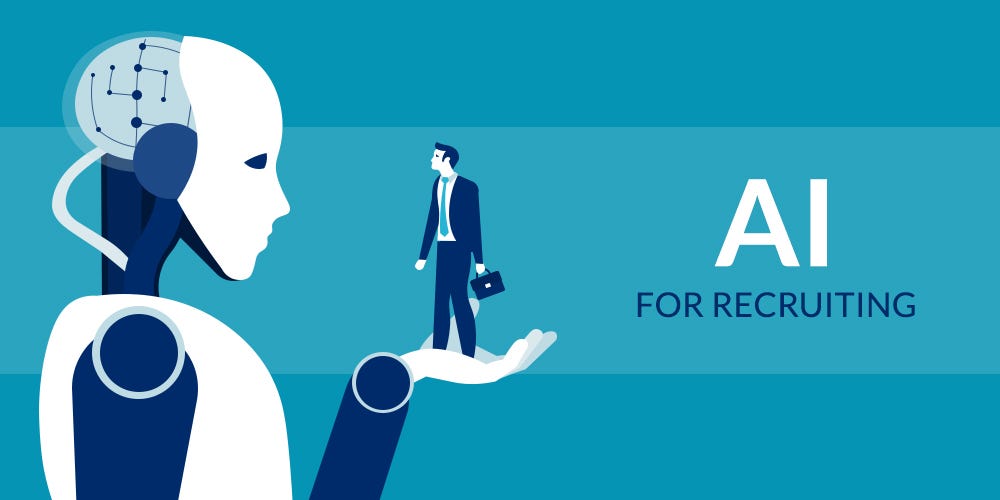How AI-Powered Tools Transform Talent Pool Management in 2025

AI-Powered Talent Pools are revolutionizing how you manage talent pools in 2025. These AI-powered tools streamline recruitment processes, making them faster, smarter, and more inclusive. For example, companies using AI for hiring are 46% more likely to make successful hires, while AI-powered screening tools reduce résumé review time by up to 75%. Additionally, 81% of HR leaders have already adopted or explored AI-Powered Talent Pools to enhance their processes. By leveraging these advancements, you can improve hiring efficiency, reduce costs, and attract top talent in a competitive market.
Understanding AI-Powered Talent Pools

What Are AI-Powered Tools?
AI-powered tools are advanced technologies designed to streamline and enhance recruitment processes. These tools use machine learning, natural language processing, and predictive analytics to automate tasks like resume screening, candidate engagement, and performance tracking. For example, AI can analyze engagement surveys and turnover rates to uncover trends, helping you make data-driven decisions. It also automates repetitive tasks, saving time and improving efficiency.
Specification/Metric | Description |
|---|---|
Data Analysis | AI tools analyze engagement surveys, turnover rates, and performance data to uncover trends. |
Automation | Automates repetitive tasks like resume screening and interview scheduling, saving time. |
Predictive Analytics | Identifies potential turnover risks by analyzing performance reviews and feedback surveys. |
Real-time Performance Tracking | Tracks employee performance through goals, feedback, and interactions, assessing sentiment. |
These tools are not just about automation. They also provide personalized learning experiences and real-time insights, making them indispensable for modern talent acquisition strategies.
Why AI Is Essential for Talent Acquisition
AI plays a crucial role in improving talent acquisition outcomes. It enhances candidate sourcing by analyzing historical employee data to identify traits of high performers. This ensures you attract top-quality candidates. AI also reduces unconscious bias by focusing on objective data, promoting diversity in your hiring process. Predictive analytics helps you make smarter hiring decisions by forecasting candidate success based on historical data.
Enhanced Candidate Sourcing: AI identifies high-performing traits, improving candidate quality.
Bias Mitigation: AI reduces unconscious bias, promoting diversity.
Predictive Analytics: AI forecasts candidate success, aiding in better hiring decisions.
Efficient Screening: AI ranks applications quickly, ensuring qualified candidates are not overlooked.
By integrating AI into your recruitment strategy, you can create a more efficient, inclusive, and data-driven hiring process.
Challenges in Traditional Recruitment Solved by AI
Traditional recruitment often struggles with inefficiencies and biases. Many business leaders report difficulties in sourcing the right volume and quality of applicants. For example, 31% of U.S. leaders face challenges in finding quality candidates, while 27% struggle with processing applications. AI addresses these issues by automating tasks like screening and shortlisting, ensuring you focus on the most qualified candidates.
AI also improves candidate engagement by providing real-time updates and personalized communication. This ensures a positive experience for applicants, which is critical in a competitive job market. By solving these challenges, AI transforms recruitment into a more streamlined and effective process.
Benefits of AI in Talent Acquisition

Enhancing Candidate Experience Through Personalization
AI-powered tools are transforming how you interact with candidates by delivering a personalized experience at every stage of the recruitment process. These tools automate follow-ups, ensuring candidates receive timely updates, which reduces drop-off rates. For example, AI can provide immediate responses to candidate queries, making them feel valued and informed. This level of responsiveness improves their overall experience and satisfaction.
Companies like Unilever have seen remarkable results by integrating AI-driven applicant tracking systems (ATS). They reduced hiring time by 50% while significantly enhancing candidate satisfaction. Additionally, AI matches candidates with roles that align with their skills and experience, improving the quality of hires.
Improvement Area | Description |
|---|---|
Improved speed and efficiency | Automating candidate follow-ups reduces time-to-hire and improves conversion rates. |
Continuous engagement | AI-automated follow-ups keep candidates informed at each stage, reducing drop-off rates. |
Improved responsiveness | Immediate feedback to candidate queries enhances their feeling of being informed. |
Quick decision-making | Processing large volumes of data allows for faster decisions on candidate progression. |
Improved quality of hires | AI matches candidates with job openings that align with their skills and experience. |
By enhancing candidate experience, you can attract top talent and build a positive employer brand.
Reducing Bias in Recruitment Processes
Bias in recruitment has long been a challenge, but AI is helping to create a more inclusive hiring environment. AI tools can analyze diverse datasets, minimizing biases in screening and selection. This ensures that candidates are evaluated based on their skills and qualifications rather than subjective factors. Research by Binns (2018) highlights how AI algorithms trained on diverse data can significantly reduce bias, fostering a more equitable recruitment process.
Moreover, AI's ability to focus on objective data promotes diversity in your talent pool. While some respondents express moderate agreement about AI's role in reducing bias, its potential to attract a varied workforce remains undeniable. By implementing AI, you can take a significant step toward fairer and more inclusive recruiting practices.
Predictive Analytics for Smarter Hiring Decisions
Predictive analytics is revolutionizing how you make hiring decisions. These tools analyze historical data to forecast candidate success, helping you identify the best fit for your organization. For instance, companies like Unilever have reduced their hiring time from four months to just four weeks using predictive analytics, saving over 50,000 recruiter hours annually.
Area | Metric Impact | Business Outcome |
|---|---|---|
Efficiency | 30% faster hiring processes | More streamlined recruitment |
Cost Management | 30% reduction in cost-per-hire | Better budget management |
Quality | Higher retention rates | Stronger long-term results |
Productivity | 50,000+ recruiter hours saved | More focus on strategic tasks |
By leveraging predictive analytics, you can streamline your recruitment process, reduce costs, and improve the quality of hires. This data-driven approach ensures smarter, more strategic hiring decisions.
Boosting Efficiency and Reducing Costs
AI-powered tools have become essential for improving recruitment efficiency and cutting costs. These tools streamline processes like candidate screening and sourcing, allowing you to focus on strategic tasks. For instance, AI can automate repetitive tasks such as résumé reviews and interview scheduling, which helps reduce time to hire significantly. Companies using AI tools report a 30% reduction in hiring costs per hire, making it a cost-effective solution for modern recruitment challenges.
One of the most impactful benefits of AI is its ability to reduce time to hire. By automating the screening process, AI ensures that only the most qualified candidates move forward. This efficient screening not only saves time but also enhances the quality of hires. Additionally, AI tools improve candidate sourcing by analyzing large datasets to identify top talent quickly. This ensures you attract the right candidates without wasting resources.
Aspect of AI Impact | Mean Score | Standard Deviation |
|---|---|---|
Overall impact on recruitment outcomes | 3.79 | 1.6 |
Improved efficiency of recruitment process | 3.82 | 1.6 |
Streamlined candidate screening process | 3.76 | 1.01 |
AI also contributes to an improved candidate experience. By automating communication and providing real-time updates, these tools keep candidates informed and engaged throughout the hiring process. This responsiveness not only builds trust but also reduces drop-off rates. Furthermore, companies using AI have seen screening costs reduced by 75%, highlighting its financial benefits.
By integrating AI into your recruitment strategy, you can achieve faster, smarter, and more cost-effective hiring. These tools empower you to optimize resources while maintaining a high standard of recruitment outcomes.
Practical Applications of AI Recruiting
AI-Driven Talent Pool Nurturing
AI-powered talent pools allow you to nurture your existing talent pool more effectively. These tools analyze data to identify high-potential candidates and keep them engaged through personalized communication. By leveraging AI, you can maintain relationships with passive candidates, ensuring they remain interested in future opportunities. This approach reduces the need to start from scratch every time you recruit.
AI-driven nurturing strategies also improve efficiency and cost management. For example, companies using these tools report a 30% reduction in cost-per-hire and faster hiring processes. Higher retention rates and streamlined recruitment processes are additional benefits.
Area | Metric Impact | Business Outcome |
|---|---|---|
Efficiency | 30% faster hiring processes | More streamlined recruitment |
Cost Management | 30% reduction in cost-per-hire | Better budget management |
Quality | Higher retention rates | Stronger long-term results |
Productivity | 50,000+ recruiter hours saved | More focus on strategic tasks |
These metrics highlight how AI-powered recruiting tools can transform your recruitment strategy by optimizing your existing talent pool.
Personalized Candidate Engagement Strategies
AI-powered tools enhance candidate engagement by tailoring communication to individual preferences. These tools use data to send personalized messages, recommend roles, and provide real-time updates. For example, AI can analyze a candidate's skills and suggest positions that align with their expertise, improving their experience and increasing the likelihood of acceptance.
Research shows that personalized engagement strategies lead to significant improvements. Gartner reports a 40% increase in candidate engagement, while LinkedIn Talent Solutions highlights a 20% improvement in engagement and a 30% increase in retention rates.
By focusing on engagement, you can build stronger relationships with candidates and improve your employer brand.
Automated Screening and Shortlisting
Automated screening and shortlisting streamline recruitment by quickly identifying the most qualified candidates. These tools use AI to analyze resumes, match skills to job descriptions, and rank applicants based on their suitability. This process reduces the time spent on manual resume filtering and screening, allowing you to focus on top-tier candidates.
Organizations using automated screening tools report a 25% improvement in the quality of hires due to reduced bias. Additionally, these tools cut time-to-hire by 30%, making recruitment faster and more efficient.
Organizations using automated screening tools have reported a 25% improvement in the quality of hire due to reduced bias.
Companies utilizing these tools have reduced their time-to-hire by 30% on average.
By integrating automation into your recruitment process, you can save time, reduce costs, and ensure a fair evaluation of candidates.
Real-Time Insights for Recruitment Optimization
AI-powered tools provide you with real-time insights that transform recruitment processes. These insights allow you to monitor and optimize every stage of hiring, ensuring smarter decisions and better outcomes. By analyzing data instantly, you can identify bottlenecks, improve efficiency, and enhance the candidate experience.
One of the most significant benefits of real-time insights is their measurable impact on recruitment performance. For example, companies using AI tools have reported the following improvements:
Metric | Improvement Description |
|---|---|
Hiring Time Reduction | Reduced from four months to four weeks |
Recruiter Hours Saved | Over 50,000 hours annually saved |
Time-to-Hire | Cut by 30% |
Cost-per-Hire |
These metrics highlight how real-time data can streamline your hiring process and reduce costs. By leveraging these insights, you can allocate resources more effectively and focus on strategic tasks.
Real-time insights also help you stay ahead of market trends. AI tools analyze hiring demands and provide immediate feedback, enabling you to adapt quickly. This ensures you remain competitive in attracting top talent. Additionally, these insights improve transparency in your recruitment process, which enhances the candidate experience. Applicants appreciate timely updates and clear communication, which builds trust and reduces drop-off rates.
With an advanced ATS, you gain access to real-time metrics that optimize your recruitment strategy. These tools allow you to track time-to-hire, candidate engagement, and cost-per-hire, ensuring data-driven decisions. By integrating real-time insights into your ATS, you can create a more efficient and competitive hiring process.
AI-powered insights empower you to refine your recruitment approach continuously. By embracing these tools, you can achieve faster, smarter, and more cost-effective hiring outcomes.
Future Trends in AI-Powered Talent Pools

Advanced Natural Language Processing (NLP) in Recruitment
Natural Language Processing (NLP) is transforming how you approach recruitment. AI recruiting tools powered by NLP can process thousands of resumes in minutes, making screening faster and more accurate. These tools analyze language patterns to identify relevant skills and qualifications, ensuring you focus on the most suitable candidates.
Large language models are also enhancing communication. AI chatbots use NLP to provide personalized responses to candidates, answering queries and offering updates on application status. This improves engagement and reduces frustration during the recruitment process. Research from Cornell University highlights how NLP frameworks can summarize resumes automatically, saving time and improving efficiency. By leveraging NLP, you can streamline your recruitment process and create a more inclusive hiring environment.
Predictive Analytics for Workforce Planning
Predictive analytics is reshaping workforce planning by helping you anticipate future talent needs. These tools analyze historical data to forecast trends, enabling you to align your talent acquisition goals with organizational objectives. For instance, IBM’s retention model achieves 95% accuracy in predicting employee turnover, allowing you to address risks proactively. Google uses predictive models to identify skill gaps by examining certifications and project histories, ensuring your workforce remains competitive.
Key metrics like employee turnover rates and skills gap coverage guide decision-making. Predictive analytics enables you to reduce attrition by up to 25% and achieve 90% coverage of critical skills. By adopting these tools, you can move from reactive hiring to proactive workforce planning, ensuring your organization stays ahead in a dynamic market.
KPI Category | Metrics | Target Impact |
|---|---|---|
Retention | Employee turnover rate, High-performer retention | 15-25% decrease in attrition |
Recruitment | Time-to-hire, Cost-per-hire, Quality of hire | 30% cut in hiring expenses |
Skills Management | Skills gap coverage, Training effectiveness | 90% coverage of critical skills |
Model Accuracy | Prediction accuracy rate, False positive rate | Over 85% accuracy benchmark |
AI Chatbots for Enhancing Candidate Experience
AI chatbots are revolutionizing how you engage with candidates. These tools provide instant updates on application status, addressing common frustrations about waiting. Candidates appreciate the streamlined application process, which reduces completion time from 20 minutes to just 5 minutes. Chatbots also offer role-specific tips and mock interview sessions, helping candidates prepare effectively.
Organizations using AI chatbots report a 40% increase in engagement and higher retention rates. Post-interview feedback is delivered promptly, improving candidate sentiment and increasing the likelihood of reapplication by 55%. Additionally, AI recruiting assistants enhance interview show rates by 20%, ensuring a smoother recruitment process. By integrating chatbots into your strategy, you can create a more engaging and efficient experience for candidates.
Ethical AI Practices in Recruitment
Ethical AI practices play a crucial role in creating fair and transparent recruitment processes. As you adopt AI-powered tools, you must ensure they align with ethical standards to avoid unintended consequences. These practices help you build trust with candidates and maintain compliance with legal and social expectations.
One key aspect of ethical AI is addressing biases in data input. AI systems rely on historical data to make decisions, but biased data can lead to unfair outcomes. For example, if past hiring data reflects gender or racial disparities, the AI might replicate those patterns. You can prevent this by carefully curating datasets and ensuring they represent diverse groups.
Ethical AI also emphasizes the importance of non-discrimination. Recruitment tools must not disadvantage protected groups based on factors like race, gender, or age. By implementing safeguards, you can ensure that AI evaluates candidates solely on their skills and qualifications.
To maintain accuracy, you should cross-reference AI outputs with human analysis. While AI excels at processing large datasets, human oversight ensures that decisions align with organizational values. This collaboration between AI and human judgment creates a balanced and fair recruitment process.
Ethical AI practices address potential biases in data input.
AI-powered tools are transforming how you manage talent pools. These tools enable smarter, faster, and more inclusive recruitment practices. By 2025, organizations using AI will dominate talent acquisition.
A 14% rise in recruiters adding AI skills to their profiles shows its growing importance.
92% of companies report measurable benefits, with 10% achieving over 30% productivity gains.
The World Economic Forum predicts 50% of employees will need reskilling, highlighting the shift in hiring strategies.
Embracing AI ensures you attract top talent and create data-driven hiring processes, securing a competitive edge in the future workforce.
FAQ
What is the main advantage of using AI-powered tools in recruitment?
AI-powered tools save time by automating repetitive tasks like resume screening and interview scheduling. They also improve hiring accuracy by analyzing data to identify top candidates. This combination of efficiency and precision helps you make smarter hiring decisions.
How does AI reduce bias in recruitment?
AI evaluates candidates based on objective data, such as skills and qualifications, instead of subjective factors. By analyzing diverse datasets, AI minimizes unconscious bias and promotes fair hiring practices. This ensures your recruitment process remains inclusive and equitable.
Can AI help with workforce planning?
Yes, AI uses predictive analytics to forecast future talent needs. It identifies skill gaps and turnover risks, allowing you to plan proactively. This ensures your workforce remains competitive and aligned with organizational goals.
Are AI-powered tools expensive to implement?
AI tools vary in cost, but many offer scalable solutions to fit your budget. By reducing time-to-hire and improving efficiency, these tools often save money in the long run. You can start small and expand as needed.
How do AI chatbots improve candidate experience?
AI chatbots provide instant updates, answer questions, and offer personalized guidance. They streamline communication, reducing frustration for candidates. This improves engagement and builds trust, making your recruitment process more appealing to top talent.
See Also
Enhancing Employee Performance Through Talent Management Solutions
Transforming Talent Acquisition With Innovative Online Recruitment Tools
Improving Candidate Engagement With AI Recruitment Technologies
AI Recruitment Software's Influence on Today's Hiring Methods
Achieving Recruitment Excellence Through AI Solutions: MokaHR's Strategy
From recruiting candidates to onboarding new team members, MokaHR gives your company everything you need to be great at hiring.
Subscribe for more information

